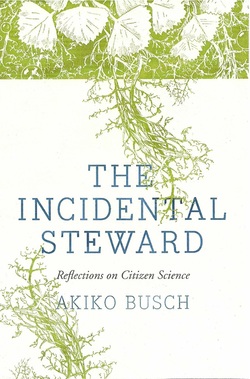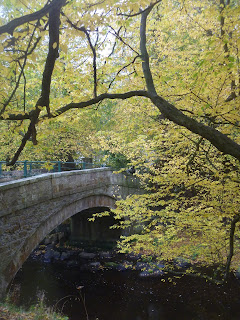This is the text of the objection email I sent to Edinburgh Council in response to the proposal to build 250 student flats on the current site of the Blue Goose Pub and Westside Motors. If you wish to object, the closing date for comments is 8 January and comments can be made on the council website
here (You'll need to type in the application reference number
15/05401/ful) or email planning@edinburgh.gov.uk (again make sure to quote the reference number
15/05401/ful).
I
wish to object strongly to the proposed development 15/05401/ful.
Although the site would be not inappropriate for a small scale
housing development, I consider the proposals as they stand to be a
gross over-development of the site and have listed my concerns below:
Ecology
and Wildlife
The area known as The Dells just upstream of the proposed development
is a beautiful area of ancient woodland, full of wildlife and
historic interest. In recent years work has been done to make it into
a Local Nature Reserve, a status that it well deserves, given its
importance for wildlife. It would be entirely inapppropriate to build
a five storey accommodation block at the entrance to the Dells.
Allowing such a development would mean the council does not value
this vital greenspace.
The
area is home to over 60 species of bird and mammal including roe
deer, otters, bats, badgers and kingfishers. Over 130 species of
wildflower grow in the Dells as well as many ancient trees. It is
also home to an interesting range of fungi, lower plants, insects and
other invertebrates. The area is frequently used by otters, which are
protected by European law. The site is also very important for bats,
also protected by European law, which roost in the viaduct near the
Visitor Centre and in the Dells. The increased light and noise which
would emanate from the proposed development would disturb the
foraging behaviour of the bats and so impact on their survival.
Kingfishers are regularly seen along this section of the river.
Kingfishers are amber listed in the UK (which means they are of
conservation concern) and feature on the City of Edinburgh Council's
Biodiversity Action Plan of species of particular conservation
concern in and around the city. Kingfishers are “vulnerable to
….habitat degradation through pollution or unsympathetic management
of watercourses” (see the RSPB website
https://www.rspb.org.uk/discoverandenjoynature/discoverandlearn/birdguide/name/k/kingfisher/index.aspx).
Grey wagtails are also frequently seen along this stretch of river, a
species which has just been added to the red list in the UK, which
means it is of particular conservation concern. Song thrushes (red
listed in the UK), bullfinches (amber listed) and swifts (amber
listed) are often seen in the area, all of which are included in the
Edinburgh Biodiversity Action Plan. Sparrowhawks (which are listed in
the Edinburgh City Biodiversity Action plan, though they are
currently green listed in the UK) nest in the area. Great spotted
woodpeckers (again green listed but included in the Edinburgh
Biodiversity Action Plan) are regularly heard and seen in the area in
springtime. (The red, amber and green listing is explained on the
RSPB website here
https://www.rspb.org.uk/discoverandenjoynature/discoverandlearn/birdguide/status_explained.aspx
The Edinburgh Local Biodiversity Action Plan can be accessed from
this page of the council's website
http://www.edinburgh.gov.uk/biodiversity.)
I
have personally seen all the above mentioned species in the area. The
Water of Leith Conservation Trust holds detailed records of sightings
of these species (and others) along this stretch of river. It is
likely that The Wildlife Information Centre for Lothians and Borders
(http://www.wildlifeinformation.co.uk/)
holds further records for the area as may also Scottish
Ornithologists Club (http://www.the-soc.org.uk/)
Edinburgh Natural History Society
(http://www.edinburghnaturalhistorysociety.org.uk/)
and other organisations. It is to be hoped that such organisations
will be consulted about the ecology and natural history of the area,
before any decisions are made relating to any development of this
site.
Streetscape
and amenity
The
character of this part of Slateford would change entirely if this
development goes ahead, as it would be to a much larger scale than
the surrounding buildings. The development would make the area more
urban in character, obscuring the views of the river and and
breaking the visual continuity of the river valley. It
would also be a shame to lose the Blue Goose pub, which has the best
beer garden in Edinburgh and is one of the few places to eat and
drink in the local area.
Scale
The Blue Goose pub is moderate in height and small in scale. The
proposed development would have 5 times the footprint and stand at
over twice the height of the existing building. The proposed
development would overshadow both the river and the walkway, making
the walkway very dark and enclosed, reducing its amenity value. The
many windows of the development would also cast noise and light,
disturbing the tranquillity of the riverside setting and walkway and
having a negative effect on the bats in the area.
Parking
The lack of on-site parking spaces included in the proposed
development would present problems to local residents. There is not
much ‘on street’ parking in the area and many students have cars
and will need to park them somewhere, restricting the on-street
parking for current residents.
Traffic
The lack of parking and manoeuvring space within the developments
will cause problems when students are moving in and out or when
deliveries are being made. This will cause obstructions and delays on
an already very congested road. It would also lead to increased
levels of pollution in the area, potentially causing increased rates
of respiratory illnesses.
Anti
social behaviour
Bringing 250 extra residents into the area, would increase the
potential for littering, loud music and vandalism. There would be
increased pressure on the sidepath through the Dells, which students
would naturally use as a short cut to Napier University, either on
foot or by bike.
In
principle I would be happy for a small scale housing development on
the site, if it took account of the surrounding natural environment
and included for example bat boxes and swift nest boxes. However, the
proposal as it stands is inapppropriate and too large in scale.




















































